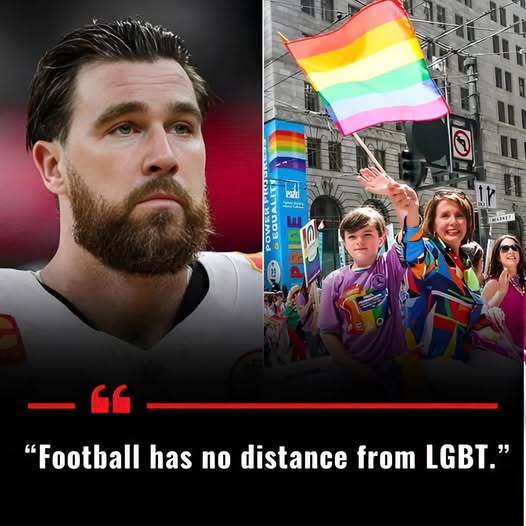Travis Kelce at the Center of a Cultural Firestorm
Travis Kelce, the Kansas City Chiefs’ superstar tight end, has never been a stranger to the spotlight. Known for his incredible talent on the field and his high-profile engagement to pop icon Taylor Swift, Kelce has become one of the most recognizable figures in American sports. But his recent words—linked to a viral image declaring “Football has no distance from LGBT”—have thrown him into the middle of one of the most heated cultural debates in the NFL’s history.
The Quote That Sparked Controversy
The phrase, “Football has no distance from LGBT,” spread rapidly across social media platforms. Whether taken literally or symbolically, the words resonated with many and enraged others. For some fans, Kelce’s statement was a bold declaration of inclusivity, breaking the stereotype that professional sports are disconnected from the LGBTQ+ community. For others, it was a betrayal of tradition and a step too far into politics for America’s most popular sport.
Reactions From Fans and Media
The reactions have been explosive. Supporters praised Kelce for using his platform to stand up for equality, calling him a modern hero who reflects the values of a younger, more progressive generation of fans. Memes, videos, and hashtags like #KelceForEquality and #FootballForAll began trending within hours.
On the other hand, critics accused him of politicizing the game. Conservative voices within the NFL fan base blasted the statement as unnecessary and divisive. Sports radio shows buzzed with callers debating whether Kelce should stick to football or if his words were long overdue.

The NFL’s Dilemma
The National Football League itself now faces a complicated situation. The league has previously supported Pride initiatives and released campaigns promoting inclusion, but it has also struggled with backlash from more traditional audiences. With Kelce’s influence and popularity at an all-time high, the NFL is caught in the middle: embrace the message fully, or risk alienating part of its fan base.
A History of Athletes and Social Statements
Kelce’s viral quote adds his name to the long list of athletes who have spoken out on cultural and political issues. From Muhammad Ali to Colin Kaepernick, sports history is filled with figures who challenged the status quo. While some lost endorsements and opportunities, many are remembered as icons who reshaped the role of athletes in society.
Kelce may not have expected to be compared to such figures, but his statement has already secured him a place in the broader conversation about sports and activism.
Support From the LGBTQ+ Community
LGBTQ+ organizations and advocacy groups quickly voiced support for the sentiment, with many praising Kelce’s willingness to stand up in a space where such topics have often been taboo. Pride organizers noted that football players rarely make headlines for inclusivity, and Kelce’s statement could inspire young athletes to feel safer and more accepted.
Will It Affect His Career?
Some analysts argue that Kelce’s on-field reputation and superstar status will protect him from any serious consequences. As long as he continues performing at an elite level, the Chiefs and the NFL are unlikely to distance themselves from him. However, endorsement deals and fan relationships may take a hit depending on how the story develops.
The Bigger Question
The debate sparked by Kelce’s words goes beyond football. It raises the question: should athletes remain silent on social issues, or should they use their influence to spark change? Kelce’s quote may have divided fans, but it has also opened the door for deeper discussions about representation, inclusivity, and the role of sports in modern society.
Conclusion: A Spark That Won’t Burn Out Soon
Travis Kelce’s statement—“Football has no distance from LGBT”—has proven to be one of the most polarizing moments of his career. Whether seen as a heroic stand for equality or a controversial overreach, the impact is undeniable. The NFL now finds itself under the microscope, and Kelce’s words have ensured that the conversation around sports and inclusivity will continue long after the season ends.


